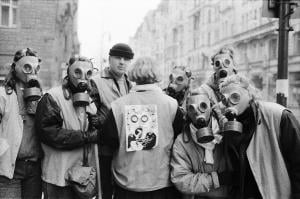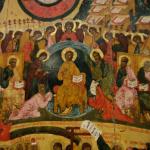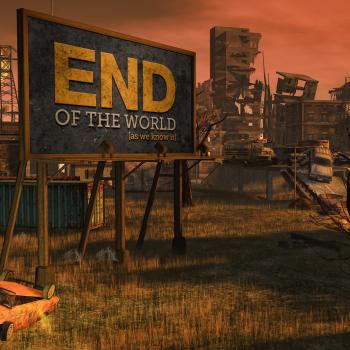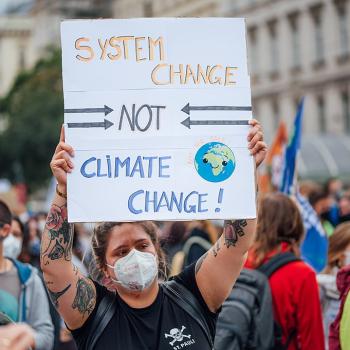
Climate change is upon us, and has been upon us for a long time. We see and experience more and more of its devastating effects, such as in the increasing frequency of wildfires and terrible storms wrecking destruction all around the world. Sadly, many of its effects, at least initially, can be quite subtle, so that we do not notice them. It is only with hindsight can be see how climate change has adversely affected the world we live in (and then, it is often too late). As a way to explain our relationship with the environment and the way we tend to ignore the harm we do, even when we abuse the world around us, Sallie McFague suggested we consider the way addicts act:
Ecological deterioration is more like alcohol or other drug addiction than war: it creeps up on us daily so that we become used to it rather than announcing destruction in the glaring headline it deserves — “We Declared On Planet.” Like addiction, ecological deterioration is insidious. We become used to the smell of automobile exhaust fumes and open landfills, inured to the sight of dead rabbits and possums by the roadside, habituated to tall trees being felled to make room for more office buildings, accustomed to children playing on city sidewalks devoid of grass and trees. We become so used to diminishment, so used to environmental decay, that many even deny that it is occurring. [1]
Thus, not only have we experienced environmental decline during our lives, we have grown accustomed to its effects. Many today do not even know what the world was before environmental concerns started having us deal with pollution and other environmental hazards. They have not seen how bad we treated it and how bad it can be when we are unconcerned about being good stewards of the world. They do not know a barely affected by climate change. The rest of us have forgotten, and have accepted the way things are now as normal, when they are not. Environmentalism has helped rectify some of the harm we have caused, but not enough; what we have done is just enough to hide the full effects of our actions. This is why many shrug when they are told many of the environmental protections which have been put in place are being dismantled, because they do not know how bad it was before those protections were in place, nor how swift things can become worse when we do not properly take care of our world.
Christians should know better. They have been told, in Scripture, tradition, and by many modern authoritative voices (such as the Pope of Rome and the Patriarch of Constantinople) that they should be concerned about the environment and climate change. Sadly, no matter how much they are told this, too many reply that the world is not our home, that it doesn’t if the world is devastated or destroyed. They say the only thing we should be concerned about is the salvation of souls. It is amazing how prevalent this response is despite the way the way we are told to work out our salvation with fear and trembling, making sure our will follows and cooperates with God’s will. God made the world and made it good, and wants us to take care of it. It is also important to note that those who make such an argument, saying the world is not our final home so we should not care if it gets trashed, are very inconsistent; they use it to excuse their own irresponsibility to the world, but if they find pollution causing themselves pain and sorrow, if they find their health is adversely affected by it, they would be the first to fight for change (after all, who will not fight against sewage being put into their water supply?). Why do they care, if the world is only their temporary home?
Christians are to care for the world and what is in it. Humanity has been made to be stewards of the earth, not is destroyer. Scripture and tradition, as Robert Wennberg points out, can be used to provide all kinds of reasons why Christians (and the rest of humanity) should be concerned with the environment:
Ecologically sensitive and biblically informed Christians would argue, however, that there are strong and plausible biblical grounds for exercising stewardly care and restraint in our use of nature, grounds that we have too often neglected or overlooked. And it may be that they were overlooked in part because the Christian community was overreacting to pagan animism, more concerned with rejecting pagan error than with adequately affirming Christian truth. And, of course, this is often – indeed, too often – the case: our own beliefs and attitudes are themselves shaped by the very falsehoods that we rightly seek to repudiate. In the very act of repudiation we twist and distort the truth that prompted the repudiation. [2]
Life is of value. The Holy Spirit is the Lord and giver of life, not just for humanity, but for all life. If we value life, we will value life wherever it is found (and not just human life). We must stop thinking only of ourselves, thinking that only humanity is important. We must not follow such a selfish (and potentially prideful) worldview. We must look to Jesus. He came into the world to serve us, to show us love and lift us up with grace. If we want to follow after him, we must follow his example. We must look to the world and what is in it with the same kind of love that he showed us, serving it with love and grace. Being environmentally concerned, as Jay McDaniel said, is one way we are to do this:
To be life-centered is to be respectful both of life and environment. As a way of looking at the world, biocentrism is an antidote to that human-centeredness that sees humans as the measure of all things and that believes humans, and humans alone, are worthy of our moral regard. Inasmuch as human beings are members of the family of terrestrial life, and perhaps even its most precious members, life-centeredness involves a deep and abiding commitment to their wellbeing. [3]
We still have time to change. We have time to bring healing to the world. Christians, if they are to follow Christ, must do what they can to bring this about. If they do not, do they truly grasp what it means to be a disciple of Christ?
[1] Sallie McFague, The Body of God: an Ecological Theology (Minneapolis: Fortress Press, 1993), 3.
[2] Robert N. Wennberg, God, Humans, and Animals (Grand Rapids, MI: William B. Eerdmans Publishing Company, 2003), 21.
[3] Jay B. McDaniel, Of God and Pelicans: A Theology of Reverence For Life (Louisville, KY: Westminster/John Knox Press, 1989), 14.
Stay in touch! Like A Little Bit of Nothing on Facebook.
If you liked what you read, please consider sharing it with your friends and family!
N.B.: While I read comments to moderate them, I rarely respond to them. If I don’t respond to your comment directly, don’t assume I am unthankful for it. I appreciate it. But I want readers to feel free to ask questions, and hopefully, dialogue with each other. I have shared what I wanted to say, though some responses will get a brief reply by me, or, if I find it interesting and something I can engage fully, as the foundation for another post. I have had many posts inspired or improved upon thanks to my readers.

















